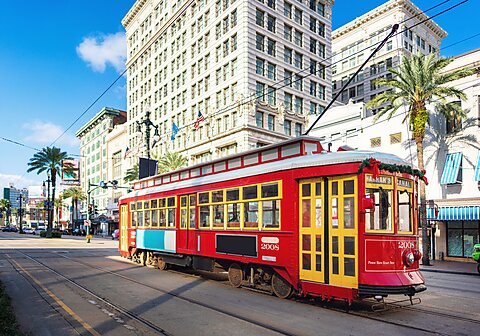Federal Transit Administration data for fiscal year 2022 show that operating expenses per streetcar ride averaged $10.80 while fare revenues were only $0.97 per ride. As a result, the average streetcar trip—even though it is less than two miles—produced an operating loss of $9.83. This cost primarily falls on the shoulders of federal, state, and local taxpayers. With such short trips, micromobility is a much better option if the policy objective is a reduction in automobile traffic and resulting emissions.
Operating expenses per rider varied widely across systems as the accompanying chart shows. Relatively efficient and well‐used systems in Tampa, Tucson, Kansas City, and Philadelphia brought down the average. Most systems had operating costs exceeding $16 per ride, which is more than the cost of a short Uber ride.
The cities with the most costly streetcar systems on a per‐passenger basis are St. Louis (which we discussed previously), Washington DC, and Atlanta. Despite being free, the DC Streetcar carried less than a thousand riders per day in FY 2022. Last year, the DC City Council wisely decided to defer plans to extend the current 2.4‑mile system by an additional 2.2 miles at an estimated cost of up to $100 million.
In 2016, Reason Foundation Transportation Director Baruch Feigenbaum characterized the Atlanta Streetcar as possibly the worst US transportation system ever constructed, noting that the project was plagued with safety problems, disappointing ridership, and fare evasion. Service on the line was suspended between November 2022 and June 2023 because of safety concerns with “the specially‐crafted $400,000-a-piece wheels” on all four of the system’s cars.
Yet, despite its poor results to date, the Metropolitan Atlanta Rapid Transit Authority is planning a $230 million extension to the streetcar with an estimated completion date in 2028.
The high cost of building and extending streetcar lines is not included in the operating costs listed earlier. And these capital costs are mounting. A 3‑mile streetcar project in Omaha, Nebraska expected to open in 2026 was projected to cost $440 million, up from a 2016 capital cost estimate of $169.8 million. Likewise, a 4.15-mile streetcar project being completed in Santa Ana, California was last estimated to cost $579 million, after multiple upward adjustments. It remains to be seen whether it will actually open next year as expected, and how much it will cost to operate per rider.
Do Benefits Justify the Costs of Construction?
Streetcar project sponsors seeking federal funding are often required to submit benefit‐cost analyses (BCAs) to justify their plans. In theory, a BCA provides rigorous proof that project benefits exceed costs, and thus merit support. Unfortunately, BCAs often use unrealistic assumptions, such as overstated ridership and understated construction and operating cost estimates.
While Kansas City has one of the more efficient streetcar systems in terms of operating costs, it is not immune to construction costs and time overruns. The 0.7‑mile Riverfront extension has seen its projected cost increase from $20.2 million in 2021 to $61.1 million in late 2023. Construction was originally supposed to start in 2018 and end in 2021; as of now, it is anticipated to be completed by 2025. The extension’s benefit‐cost analysis was conducted based on the projected construction costs and timeline at the time of its publication in 2018.
An additional benefit‐cost analysis was undertaken in 2020, with the main difference being the removal of all mentions of a pedestrian and bicycle bridge that was supposed to be part of the original plan. Despite this, the discounted benefit‐cost ratios remained similar in 2018 and 2020, at 1.59 and 1.75, respectively. While the rhetorical push for streetcar and other expensive transit projects often relies heavily on sustainability impacts, in both Kansas City BCAs environmental benefits are a tiny portion of the total benefits (3.45 percent in 2018 and 0.55 percent in 2020).
By far, the major contributor to the benefits in these BCAs is the economic impact (95 percent in 2018 and 99 percent in 2020), which is spurious at best, and, even if true, is a shining example of subsidizing individual interests (concentrated benefits and diffuse costs) at the expense of taxpayers.
Instead, if federal, state, and local dollars stayed in the pockets of taxpayers, they would be put to far more productive uses in the market, which would not only allocate resources more efficiently but would allow for innovative, value‐adding solutions to problems, transportation and otherwise.
The author thanks Jerome Famularo for providing research assistance during the preparation of this essay.

